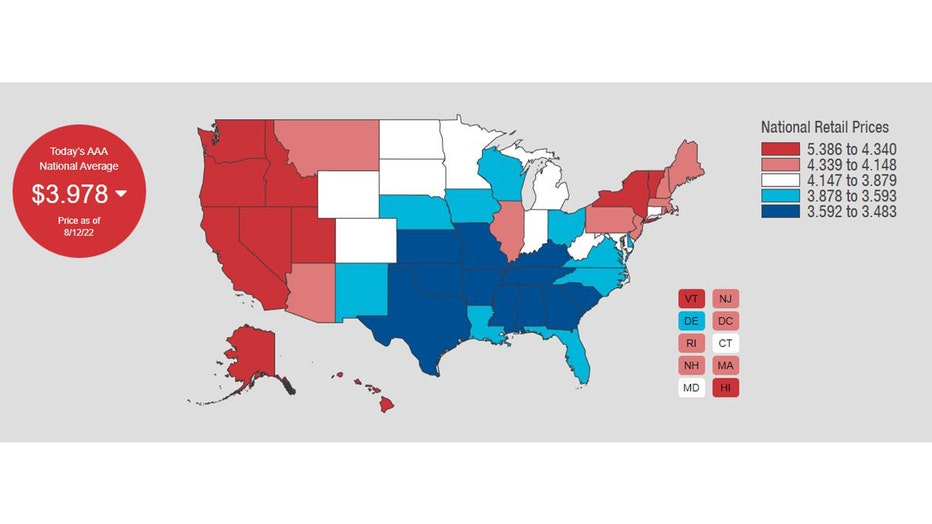Why are gas prices falling and will it continue?
TAMPA, Fla. - Gas prices are continuing to fall, and with the national average for a gallon of gas dropping below $4 for the first time in months, it begs the question: Why are they going back down? And will they stay down?
According to AAA, the average price of regular unleaded gas nationwide is now $3.97 per gallon. In Florida, the current average is less at $3.68. Locally, AAA reports the average price for gas in Tampa and St. Pete is $3.62.
The rest of Pinellas County and Polk County have the lowest average price at the pump in the Tampa Bay region at $3.59.
Comparing recent prices, gas went down 15 cents in the past week and is now 69 cents lower than last month. So, why now?

Gas average across country as of Friday, Aug. 12. (Source: AAA)
OPEC – the Organization of Petroleum Exporting Countries – lowered its forecast of upcoming global demand and crude oil prices have continued to drop. Some states are also suspending gas taxes to help overall costs.
Energy is a key factor in the cost of many goods and services, and falling prices for gas, airline tickets and clothes are giving consumers a bit of relief, although inflation is still close to a four-decade high.
"I'm not tickled pink, but I'm happier it's less than what it was," said Glen Smith, a private transportation driver, "because, there for a while, every two days I put $50 of gas in my car. Every two days."
The current price of gas is still 80 cents per gallon higher than a year ago. One factor that could drive prices back up is a hurricane. Maintenance of oil refineries could also slow production.
READ: Gas prices coming down but inflation will likely stay high
Oil prices began rising in mid-2020 as economies recovered from the initial shock of the pandemic. They rose again when the U.S. and allies announced sanctions against Russian oil over the country’s war against Ukraine.
Recently, however, oil prices have dropped on concern about slowing economic growth around the world. U.S. benchmark crude oil has recently dipped close to $90 a barrel from over $120 a barrel in June.
It is unclear whether gasoline prices got so high that consumers cut back on their driving. Some experts believe that is true, although they acknowledge that the evidence is largely anecdotal.
Peter Schwarz, an expert on energy pricing and an economics professor at the University of North Carolina at Charlotte, said he expects oil prices to remain relatively stable at least for the next month or so, particularly after OPEC and partners including Russia agreed to only a small oil production increase in September, which won’t be enough to drive prices lower.

Inflation at 40-year high
New numbers show inflation is at a 40-year high, and economists aren't sure when we'll get some relief. As people around Tampa Bay cope with higher costs, people of all ages are having to make some tough decisions.
Christian vom Lehn, an economics professor at Brigham Young University, said the price of oil is the key factor for gasoline, but that seasonal trends could also keep prices from surging again.
"We are coming to the end of summer, and summer is a peak travel season, so demand is naturally going to fall," he said. "That is certainly contributing to the most recent decline" in gas prices.
The average gas price has dropped 58 straight days, but that streak will end soon, predicted Tom Kloza, head of energy analysis at the Oil Price Information Service. He said the industry will face challenges to meet gasoline demand for the rest of the year.
Kloza noted that it’s still early in the hurricane season, which in the past has shut down some of the nation’s biggest refineries that sit in hurricane-prone areas of the Gulf Coast; the Gulf of Mexico is speckled with oil-producing platforms. Also, he said, "refinery runs will come down because of a lot of delayed maintenance that can’t be delayed indefinitely."
Prices at the pump are likely to be a major issue heading into the mid-term elections in November.


